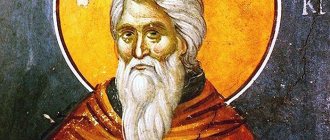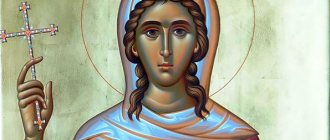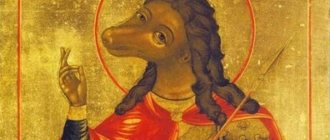| Mch. Uar. Greek icon |
Uar of Egypt
(Greek Οὔαρος ὁ ἐν Αἰγύπτῳ; + 307), military leader, martyr Memory October 19, October 25 (Greek [1])
The holy martyr Uar and seven Christian teachers lived in Egypt in the city of Alexandria during a period of special persecution of Christians (late 3rd - early centuries). Huar was a military leader and secretly believed in Christ, while the army, like the entire Roman state, professed paganism. The prisons were quickly filled with followers of Christ. As soon as night fell, Uar made his way into the dungeons and visited the arrested Christians, bringing them food, removing their shackles and washing their wounds.
One day, seven Christian teachers were thrown into one of the prisons. Having confessed their faith before the judge, they remained in prison, awaiting execution of the death sentence. Arriving at night to these seven prisoners, Uar began to ask them to pray to the Lord to grant him strength and firmness in the faith. After praying together, the military leader became stronger in spirit and no longer experienced anxiety, finally deciding to no longer hide his faith in Jesus Christ and openly declare it.
In the morning, one of the seven teachers died, and the remaining six were brought to trial. The cruel governor, seeing that there were fewer arrested Christians, asked about the seventh. And then Uar announced his faith in Christ, saying that he was the seventh. The governor did not want to lose such a valuable warrior and tried to persuade him to renounce his beliefs, but everything was unsuccessful. The martyr declared that no earthly blessings would turn him away from the One God.
Convinced of the special firmness of Uar’s faith, the governor ordered him to be subjected to severe beatings, during which the holy martyr died. Then Christian teachers were truncated. This was in 307. The tortured body of the martyr was thrown into a landfill outside the city. That same night, a pious widow named Cleopatra buried the body of Uar. A few years later, when the persecution of Christians subsided, she transferred the saint’s relics with honor to her homeland in Palestine.
| Mch. Uar. Icon of the Lukh Nikolo-Tikhonov Monastery. |
When the service Menaion of 2018-2019 was republished by the Moscow Patriarchate Publishing House, “the service to the martyr Uar” was removed from the October volume, since it “has an Old Believer non-priest origin and is based on a dubious tradition about the grace of the martyr to beg the unbaptized, which is not confirmed by the ancient sources of his life, in the first place turn Greek"
[2].
Brief biography
The saint lived at a time when the Christian faith was outlawed and considered heresy, undermining the foundations of the Roman Empire. The pantheon of Roman gods demanded worship from all citizens; it was possible to confess Christ only in secret; believers performed rituals in caves, hidden from the authorities. Christians were poisoned in the arenas with wild animals, tortured, publicly executed, demanding renunciation.
Origin
Uar (in Latin Varus) lived at the turn of the 3rd-4th centuries. The young man came from a noble family, his career in the army of Emperor Diocletian was successful. Uar commanded a cohort in Egypt, one of the provinces of the empire. He earned the respect and love of his subordinates and was held in high esteem by his superiors.
Uar professed the Christian faith in secret, in his position he monitored the observance of the rituals of worship of the Roman gods, and he prayed to Jesus when no one was looking.
Life and service to God
The visible life of the saint was devoted to the fulfillment of military duty and the service of Roman laws. In Uar's soul there lived a deep faith in Jesus, admiration for those who are not afraid to openly profess Christianity and endure torment without renouncing God. Open admission of belonging to a forbidden faith meant shame, humiliation, expulsion from the army, torture, and painful death.
In Alexandria, there was a group of Christians in prison, who were tortured, demanding renunciation, and sentenced to death. Uar secretly visited the prisoners, tried to ease their suffering, bandaged their wounds, and carried food. The saint fulfilled his Christian duty and deep spiritual need to be with fellow believers.
Unable to withstand the torture, one of the prisoners died. Uar realized that the Lord had given a sign that the time had come to overcome the fear of pain and declare belonging to the persecuted. Admiring the courage of Christians and the indestructibility of their spirit, the young man stands in the place of the deceased prisoner and before the court admits that he believes in Jesus.
Martyrdom
Uar's statement plunged the judges and the emperor's governor into anger, and they gave the order to force the saint to renounce. The army was losing an experienced commander, and the prestige of the empire was seriously damaged. Uar did not succumb to persuasion and exhortation, asking the prisoners to support him with prayers. They tortured the saint for a long time and terribly, trying to wrest his renunciation of Christ. They beat Uara with sticks, nailed his legs to a tree, and tore off the skin from his back. Seeing Uar’s tenacity, the executioners became furious and increased their efforts.
When the saint fell, they beat him on the stomach with sticks until his entrails fell out to the ground. The torture continued for a long time; Uar, abandoned by his tormentors, died five hours later. The death of the saint occurred around 307. Christian associates were also executed.
Information: Uar became famous for his strength of spirit, his unshakable faith in Christ, and his readiness to accept torture and death. The saint managed to overcome his fears, declared himself a follower of Christ, “stood for Him even to the point of blood.”
The Life and Martyrdom of Saint Huar
The early Christian saint Uar of Egypt lived in the 3rd and 4th centuries. He came from a noble family and was a valiant Roman commander. At that time, the persecution of Christians was still ongoing. Therefore, Uar kept his affiliation with the Holy Church secret. He admired the feat of the Christian martyrs who were executed for publicly confessing their faith. But at the same time he did not dare to follow their example. At the same time, Uar actively helped the arrested co-religionists at night: he took care of their wounds, brought food, and encouraged them.
Holy Martyr Uar
Once Uar spent the whole night in prison with seven Christian preachers awaiting execution. Together they talked and prayed. The day before, the prisoners were brutally tortured, so by the morning one of the sufferers died. Priest Philip Ilyashenko notes:
“Then Uar realized that the time had come for a test of his faith. That he must show that courage, the absence of which he mourned.”
When the prisoners were led to execution, Uar joined them, publicly declaring himself a Christian. Thus, he replaced the deceased preacher. The enraged executioners postponed the execution in order to subject Uar to sophisticated torture.
During torture, the saint remained firm and encouraged his fellow believers. Only after five hours of suffering did the martyr Uar give up the ghost and his soul ascended to the Lord. After this, six imprisoned preachers were also killed. This happened in 307 in Alexandria, the main city of the Roman province of Egypt.
History of the relics
The tortured body of Uar was taken out of town by the executioners and thrown on the road. The pious Christian Cleopatra saw the execution of the saint, found the body, washed it and buried it in her house. The woman saw Uar’s feat, the tenacity of his faith, and deeply revered him for his heroic death. Cleopatra prayed at the grave, lit candles, and hoped for the intercession of the martyr for the faith before the face of the Lord.
A few years later, the widow moved from Egypt to Palestine, her homeland. Cleopatra took the remains of the saint with her. She buried the relics in the village of Edra in the family crypt, burned incense, and revered Uar as a saint. The fame of the miraculous relics quickly spread throughout the area, and the sick flocked to the grave, finding healing through prayers to the saint.
Later, Cleopatra built a temple into which the relics were transferred. The woman tirelessly prayed to the saint, considered him an intercessor and prayer before God for her family. Cleopatra's son was preparing to accept the rank of officer; a career in the army awaited him. The woman dreamed of success and happiness for her son, and asked Uar to beg the Lord for the best that was in God’s will.
During the celebration of the consecration of the built temple, John suddenly fell ill and died a short time later. Having lost her beloved only son, Cleopatra in tears addressed the saint with reproaches for her cruel lot and injustice. She grumbled about Huar, who did not respond to her prayers and requests to help her son after many years of labor and glorification of the saint.
Tired of tears and despair, Cleopatra fell asleep and had a dream. Uar and John in the shining armor of the Heavenly Host stand before her. The saint explained that he fulfilled her request exactly. John serves not in the earthly, but in the Heavenly army, by the mercy of the Lord he is close to His throne. Can we expect greater mercy? The son asked Uar not to listen to his mother’s pleas and leave him to serve the Lord. Cleopatra, in anguish, begged to take her with her, but the saint said that her time had not come.
Cleopatra told the priest and parishioners of the temple about her vision. They buried the young man next to St. Uarom. The woman’s grief and grief subsided, she found peace, but moved away from the joys of earthly life. Cleopatra distributed her property and spent days in prayer at the grave of her son and at the relics of the saint in the built church. During fervent prayers, the saint and son often appeared before the woman, supported her, and strengthened her in her faith. Cleopatra quietly departed and was canonized.
The beginning of the veneration of the martyr Huar
The remains of the martyr Huar were thrown out of the city. They were secretly taken by one of the witnesses to the execution, a Christian widow named Cleopatra. She reverently buried the holy relics in the basement of her house. A few years later, the woman moved them to her family crypt in Palestine. The shrine became famous for its miracles, and numerous pilgrims began to come to it. Therefore, Cleopatra soon erected the temple of Uar on that spot, which was consecrated in front of a large crowd of people.
At the first liturgy in the new church, the widow earnestly prayed to the saint to patronize her only 17-year-old son. The young man had to enter service in the royal army. However, that same evening he suddenly fell ill and died. Cleopatra ran to the relics of the martyr with a cry of grief and despair. There, exhausted, she fell asleep and saw Uar in a dream with her son. There was a glow coming from both of them.
The holy martyr Uar reproached the woman for her lack of faith and assured her that the young man was now under his protection. The boy also reassured his mother and said that he did not want to return from an eternal and blessed life to a world full of sin and sorrow. Then Cleopatra humbled herself and rejoiced. According to Archpriest Grigory Dyachenko, this story teaches us all:
“In all the misfortunes that befall us, we must not grumble at God, but strengthen ourselves with complete devotion to the will of God, knowing that God does everything with us for the better.”
Cleopatra solemnly buried her son next to Saint Uar. She spent the rest of her earthly life serving the Lord and went to Him in 327.
Veneration of the Saint
Huar is revered as a martyr who accepted death for the Christian faith. The saint hid his convictions for a long time, faithfully served the Roman authorities, but managed to overcome the fear of pain and decided to confess and suffer for the glory of Christ. With God's help, the saint endured torture and did not renounce or apostatize from his faith.
In Russia, many churches were built in honor of the saint. Traditions of special veneration of the martyr developed in the 16th century. The son of Tsar Ivan the Terrible, Dimitri, was born on the day of memory of Uar, and received his name at baptism. The body of the murdered youth was transported and buried in the chapel of St. War in the Archangel Cathedral of the Kremlin. The inconsolable parents of the dead children walked to the grave of Demetrius and led the sick.
During troubled times, many children died before they could receive baptism. With the permission of the church, a tradition developed to ask the saint for mercy and petition before God for those babies who were not baptized. There are icons of the saint in many Orthodox churches; the chapel of Uar is preserved in the Archangel Cathedral, which is now a museum.
The day of remembrance of the holy martyr is November 1.
UAR: number of true features "9"
People who are influenced by this number are distinguished by a heightened sense of justice and a desire to harmonize the world around them. As a rule, they have their own code of honor, and they are much more demanding of themselves than of others. Because of their reluctance to give up their principles, “Niners” can sometimes even miss the opportunity to arrange their destiny.
These people do not accept lies, no matter how beautifully packaged they are. It is unlikely that a person whose destiny is influenced by the number 9 will communicate with a liar. But if someone is honestly trying to deal with their weaknesses and shortcomings, they can always count on the help of the “niners”, because they show more leniency towards other people than towards themselves.
The life of a person under the influence of 9 is full of various events. He usually has a flexible mind and a broad outlook. This determines the interest in a variety of areas of knowledge.
Another feature of such people is the ability to support and guide others. The “Niner” will be happy to give you advice in any life situation, but will not impose his will.
In addition, people 9 are very interesting interlocutors. With them, any ordinary conversation can turn into a fascinating discussion, and their arguments and conclusions can be extremely non-trivial. However, they do not seek to convince their interlocutor that they are right at any cost; rather, their opponent himself will agree with the arguments presented, because they are so confident in themselves that this works better than any arguments.
“Niners” do not like to sit in one place; they are constantly in search of adventure. They often strive for big cities with their varied opportunities. At the same time, it is worth saying that people 9 are attracted primarily not by money, but by the opportunities for their own realization. They often want so much to benefit all of humanity that they may not notice the problems of those around them. Therefore, “nine-year” students are often not very close to their family.
The most difficult thing for a person under the influence of the number 9 is the desire to take everything very seriously. If a nine-year-old learns to allow himself some frivolity, his life will become much happier.
Iconography
On the icons of Uar they depict a young man in the clothes of a Roman soldier - waist-length or full-length. In the hands of the saint, the cross is a symbol of torment and death for the faith. Those who, like Christ, endured torment, but did not renounce the Lord, are depicted with a cross. The red color of the clothing on the icon reminds of shed blood and acquired holiness.
Around the saint, icons often depict the faces of 7 Christian teachers of Uar, who helped him gain courage, withstand trials, and supported him with prayers during torture.
The venerated icon of the saint, which has shown many miracles of healing, is carefully preserved in the Archangel Cathedral. In the 18th century icon, Saint Cleopatra is kneeling in prayer, in front of her is the martyr Huar, holding John in his arms.
UAR: number of interaction with the world “4”
People whose expression number is four are rarely attacked by doubts and worries. Typically, “fours” know exactly what they want and have a great idea of how to achieve it. Yes, few things come easy to them, but the efforts made are never in vain; in other words, such a person rarely wins the lottery, but never works without proper compensation. The average “four” student is the hope and support of his family members, relatives and colleagues. It is he who usually replaces the boss when he is sick or on vacation, gives sensible advice, advises colleagues, corrects the mistakes of others and resolves the most important issues. In his work, such a person often becomes indispensable, and an excellent addition to his outstanding business qualities is his reluctance to participate in behind-the-scenes intrigues and any dubious transactions.
“Fours” at first glance give the impression of serious, thorough and reasonable people - and this is not an illusion, that’s exactly what they are. Any negligence for them, if not an enemy, is undoubtedly a negative and unpleasant factor, and people of the four spend a lot of energy on fighting it. Preferring to stay away from any risky undertakings and dubious enterprises, “fours” are usually content with what they have, but provide themselves with maximum comfort and coziness at every stage of life. Extremely honest towards others, they expect the same from others; by lying even in small things, you can ruin your relationship with a “four-spirit” once and for all.
People of the Four, as a rule, do not recognize half measures, but they are practical and rational enough to make concessions in some cases and even allow themselves to be commanded. The behavior of a “quad” is subject to logic and is usually quite predictable for others; his goals are clear and his desires are feasible.
“Fours” pay a lot of attention to their family; constancy and responsibility are perhaps the most pronounced traits of their character. Taking care of loved ones and trying to satisfy their needs as much as possible, people of four, as a rule, strive to control the situation and not lose sight of even the most insignificant events. The “Four” may not be the recognized head of the family, but there is no doubt that not a single decision will be made without his approval.
The mistake of a “four-speaker” can be the desire for the benefits of life that are not necessary for him. Thus, wanting to comply with the wishes of parents, marriage partner or children, such a person drives himself into the trap of depression; Having learned to understand himself well and listen to his own intuition, he, on the contrary, is happy.
What is asked of the holy martyr?
Saints are intercessors and petitioners for Christians before the Lord. They support people’s prayers and help them ask for God’s help in good endeavors. The holy martyr is asked:
- about strengthening faith, helping when a person feels abandoned by God, lost;
- assistance in making difficult decisions;
- about the health and well-being of children;
- during home prayer, they pray for unbaptized deceased loved ones.
The tradition of asking the saint for mercy for those who are not Christians arose a long time ago. In the lives of the saint it is said that Cleopatra, after returning to Palestine, buried the relics among the graves of her ancestors, who were not Christians. When, after the death of her son, the woman complained that Uar had abandoned her and deprived her of mercy, the martyr appeared to her in a dream.
The saint said that he begged the Lord for those non-Christians among whom he was buried, their sins were forgiven. According to Christian traditions, Uara is considered the only intercessor before the Almighty for the unbaptized. In the troubled times that followed the death of Ivan the Terrible, the church fathers allowed prayers to the martyr for infants who died before receiving the rite of baptism, who died before birth if the mother took the sacrament before giving birth.
After the revolution in Russia, difficult times came for the Orthodox, churches were destroyed and closed, millions of people lived and died unbaptized. Orthodox Christians want to pray for deceased loved ones, to ask God for mercy for them, forgiveness of sins. The Church allows such prayers at home, privately, in front of the icon of St. War. It is prohibited to order a service in church for the unbaptized; you cannot write the names of non-Christians for mention in the liturgy and funeral services.
The Orthodox can only ask the holy martyr at home in front of the icon for those whom they love and remember, who are deprived of church support. First you need to receive a blessing for such prayers, talk with the priest of your parish, and ask for advice.
Help: home prayers in front of the Uar icon are read about deceased unbaptized loved ones.
Saint Uar as the patron saint of the unbaptized and suicides
Uar of Egypt is also traditionally revered as the patron saint of the unbaptized dead and suicides. That is, those who are not commemorated by the Church (at funeral services, memorial services, liturgy). After all, this is possible only in relation to Her members, which they become precisely in the Sacrament of Baptism. Rev. Joseph of Optina notes:
“If a deceased person did not wish to enter into living communion with God during his lifetime, then even after his death the Holy Church does not dare to do this by force.”
Suicide is a mortal sin that deprives a person of the opportunity to repent. The one who commits it deliberately breaks the connection with God. If the suicide was baptized, then he “amputates” himself from the living body of the Church.
At the same time, in Orthodoxy, independent, cell (home) prayer for the unbaptized and suicides is blessed and even considered necessary. Alms should also be given for them. All this will undoubtedly ease the lot of souls who are deprived of church commemoration. But why do they often pray to the martyr Uar for them? This is connected with the legend that the saint said to Cleopatra during his appearance with his son:
“Oh woman, why are you complaining about me... Don’t I always listen to your prayers and pray to God for you? And first of all, I begged God for your relatives, with whom you laid me in the tomb, so that their sins would be forgiven...” (St. Demetrius of Rostov, “Lives of the Saints”)
It is believed that the relatives of Cleopatra who were prayed for by the martyr were not Christians and, accordingly, were not members of the Church. Based on this conviction and the above legend, the image of Saint Uar as the intercessor of the unbaptized and those who committed suicide was established among the people.
Prayer text
The Orthodox Church allows prayers to be read in churches only for those who have received the sacrament of baptism. Church prayer to Uaru:
Troparion, tone 4
Through the army of the saints, the passion-bearer of those who suffered legally, in vain, you showed your strength courageously. And having rushed to the passion of your will, and to die lustfully for Christ, who have accepted the honor of the victory of your suffering, Ouare, pray for our souls to be saved.
Kontakion, tone 4
Having followed Christ, the martyr Uare, having drunk His cup, and wearing the crown of torment, you rejoice with the Angels: pray unceasingly for our souls.
Prayer
Oh, holy martyr Ouare! We kindle with zeal for the Lord Christ, you confessed the Heavenly King before the tormentor, and you suffered zealously for Him, and now the Church honors you as glorified by the Lord Christ with the glory of Heaven. Accept our petition and with your prayers free us from eternal torment. Amen.
Compatibility of the name Uar, manifestation in love
Uar, the logical conclusion of a romantic relationship for you is marriage and the creation of a family.
Therefore, you and people like you have been and remain the target of matrimonial aspirations of at least half of the adult representatives of the opposite sex. You are serious, reliable and honest; reticence, uncertainty, and precariousness of the situation are unacceptable to you. You are determined to take care of your loved one, regardless of the circumstances. And although your sensual manifestations are often devoid of sentimentality, external shine and ostentatious “beauty,” there will always be someone who will appreciate them. Best names for marriage, which female name best suits the name Uar
- Maria
- Daria
- Ksenia
- Vasilisa
- Margarita
- Alina
- Yana
- Elena
- Alesya
Characteristics of the name Uar
Your number is conscientious and fundamentally serious. In order to work normally, plan actions and simply be confident in your abilities, you need to have clear life principles and ideas about good and evil.
You enjoy being able to make plans, work on them, and wait for results. But herein lies the problem: unexpected changes in plans, caused by unforeseen circumstances or the demands of other people, can throw you off track. And this is fraught with conflicts.
Your main goal is to gain security in marriage, security in business, and achieve the right to remain yourself in any circumstances. This is what you are willing to give all your energy, time, love and talents to.
You enjoy being useful, so you tend to be active in religious, social, or political activities.






